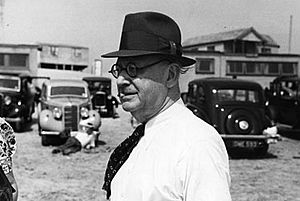Robert Wiene facts for kids
Quick facts for kids
Robert Wiene
|
|
|---|---|

Robert Wiene in the early 1930s
|
|
| Born | 27 April 1873 Breslau, Silesia, German Empire
|
| Died | 17 July 1938 (aged 65) |
| Occupation | |
| Years active | 1913–1938 |
| Relatives | Conrad Wiene (brother) |
Robert Wiene (born April 27, 1873 – died July 17, 1938) was an important film director from Germany. He worked during the time when movies had no sound, known as the silent era. Wiene is most famous for directing the German silent film The Cabinet of Dr. Caligari. This movie is a great example of a style called Expressionism. He also made many other types of films. When the Nazi party came to power in Germany, Wiene had to leave the country.
Contents
Biography
Early Life and Education
Robert Wiene was born in a city called Breslau, which was part of Germany at the time. Today, this city is known as Wrocław and is in Poland. He was the older son of Carl Wiene, a very successful theatre actor. Robert's younger brother, Conrad, also became an actor. However, Robert Wiene first chose to study law at the University of Berlin.
Start of His Film Career
In 1908, Robert Wiene began acting in small roles on stage. His first step into the world of film happened in 1912. He helped create a movie called Die Waffen der Jugend by writing the story and possibly helping to direct it.
His most well-known films are the horror film The Cabinet of Dr. Caligari (made in 1920) and Raskolnikow (made in 1923). Raskolnikow was based on a famous book called Crime and Punishment by Fyodor Dostoyevsky. Both of these movies had a big impact on German cinema at that time.
Life in Exile and Death
In 1933, just a few months after the Nazis took control in Germany, Wiene's newest film, Taifun, was banned. This meant it could not be shown. A film company from Hungary then invited German directors to come to Budapest to make movies in both German and Hungarian. Since his future in Germany was unclear, Wiene accepted this offer in September 1933. He went to direct a film called "One Night in Venice" (1934).
After that, Wiene moved to London and then finally to Paris, France. In Paris, he worked with a famous French artist named Jean Cocteau. They tried to make a new version of The Cabinet of Dr. Caligari with sound.
Robert Wiene never went back to Germany. He died in Paris on July 17, 1938. This was just ten days before a spy film he was working on, Ultimatum, was finished. He had been sick with cancer. His friend, Robert Siodmak, completed the film after Wiene's death.
Selected Films by Robert Wiene
Robert Wiene worked on over 90 movies as a director or writer. Here are some of his notable films.
As a Director
- 1912 Die Waffen der Jugend (The Weapons of Youth)
- 1915 Die Konservenbraut (The Canned Bride)
- 1916 Das wandernde Licht (The Wandering Light)
- 1917 Fear
- 1920 The Cabinet of Dr. Caligari (This is his most famous film!)
- 1920 Genuine
- 1923 Raskolnikow (Based on a famous book)
- 1924 The Hands of Orlac
- 1926 Der Rosenkavalier
- 1930 The Other
- 1934 One Night in Venice
- 1938 Ultimatum (Finished by another director after Wiene's death)
As a Writer
- The Weapons of Youth (1913)
- The Marriage of Luise Rohrbach (1917)
- The Princess of Neutralia (1917)
- The Blue Lantern (1918)
- The Homecoming of Odysseus (1918)
- The Living Dead (1919)
- Diamonds (1920)
- The Guardsman (1925)
- Typhoon (1933)
See also
 In Spanish: Robert Wiene para niños
In Spanish: Robert Wiene para niños

